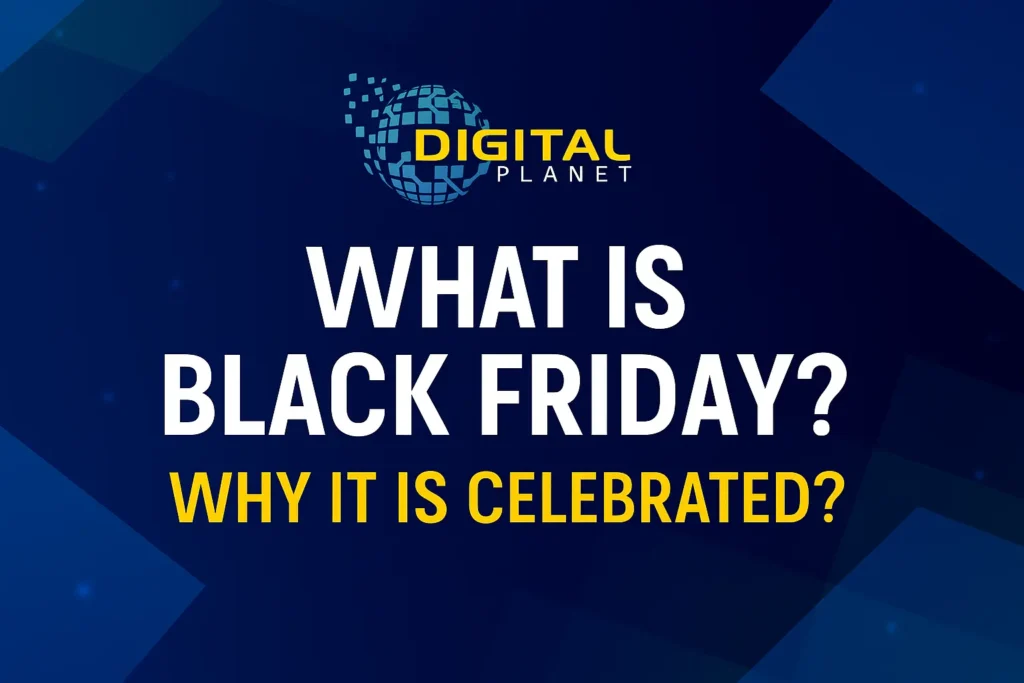What Is Black Friday? Why It Is Celebrated?

Black Friday — the name itself sparks excitement, anticipation, and a rush of unbeatable deals around the world. As one of the most iconic shopping events in the calendar, Black Friday has evolved from a simple post-Thanksgiving sale into a global retail phenomenon that marks the beginning of the holiday shopping season. But have you ever wondered where it all started, why it’s called Black Friday, and how it became such a massive global tradition? Let’s dive deep into the fascinating history, meaning, and impact of this extraordinary day.
The Origin of Black Friday: A Glimpse into History
The term “Black Friday” traces its roots back to the 1950s in Philadelphia, USA. Police officers coined the phrase to describe the chaotic traffic and crowded streets that occurred the day after Thanksgiving, when thousands of shoppers and tourists flocked to the city ahead of the annual Army-Navy football game.
Retailers, initially hesitant about the negative connotation, later embraced the term — but with a twist. They redefined “Black” as a positive financial milestone, referring to the time of year when stores finally moved from the red (losses) into the black (profits) in their ledgers. This transformation in meaning gave rise to a new cultural and commercial celebration — one that symbolized prosperity, shopping, and the start of the holiday season.
Why Is Black Friday Celebrated?
Black Friday is celebrated to kickstart the Christmas shopping season and boost retail sales. It’s a day when stores, both online and offline, offer massive discounts and promotional deals to attract consumers. For many businesses, it’s not just another sales event — it’s the most profitable day of the year.
Shoppers, in turn, eagerly await this occasion to grab their favorite products at unbeatable prices. Whether it’s electronics, fashion, home appliances, or gadgets, Black Friday sales provide an opportunity for consumers to save big while retailers enjoy a surge in revenue.
The Evolution of Black Friday: From Local Event to Global Phenomenon
Originally confined to the United States, Black Friday has now become a global celebration of consumerism. Countries like Canada, the UK, India, Australia, Germany, and the UAE have embraced the concept with open arms.
The rise of e-commerce platforms such as Amazon, Walmart, and Best Buy further amplified its reach. With online shopping dominating the modern retail landscape, consumers can now enjoy Black Friday deals from the comfort of their homes, without the chaos of physical stores.
Today, many retailers even extend their offers into a week-long or month-long event, giving rise to terms like “Black Week” or “Cyber Month.”
Black Friday vs. Cyber Monday: What’s the Difference?
While Black Friday mainly focuses on in-store and online retail deals, Cyber Monday, which follows the weekend, is dedicated exclusively to online shopping.
Retailers target tech-savvy buyers on Cyber Monday with huge discounts on electronics, software, and gadgets. Together, these two mega-events have reshaped the retail industry, encouraging businesses to plan their annual marketing and inventory strategies around them.
The Psychological Appeal of Black Friday Shopping
One of the key reasons Black Friday is so successful lies in consumer psychology. The thrill of limited-time offers, countdown deals, and “while supplies last” campaigns triggers a powerful emotional response known as FOMO — Fear of Missing Out.
Shoppers are drawn to the sense of urgency and the perceived exclusivity of the deals, motivating them to make quick purchase decisions. Retailers cleverly use this strategy to maximize sales and clear inventory before the year ends.
Additionally, the act of bargain hunting itself releases dopamine, creating feelings of excitement and satisfaction — which is why people keep coming back year after year.
Also Read: Hostinger Black Friday Sale 2025
Impact of Black Friday on the Global Economy
Black Friday’s economic impact is immense and far-reaching. Retailers often report record-breaking sales that significantly boost their annual revenue. In the U.S. alone, Black Friday sales surpass billions of dollars every year, with similar trends now visible in Europe, Asia, and the Middle East.
Beyond profits, the event also stimulates job creation in logistics, warehousing, and customer support. Online platforms experience massive traffic spikes, while payment gateways and delivery networks operate at full capacity.
For consumers, it’s a golden opportunity to upgrade lifestyles at lower costs, while for businesses, it’s a crucial time to strengthen customer loyalty and build brand recognition.
Environmental and Ethical Concerns of Black Friday
While Black Friday offers undeniable economic advantages, it also faces criticism for promoting overconsumption and waste. The frenzy of mass purchasing often leads to discarded packaging, unsustainable production, and excessive carbon emissions from shipping.
Many environmental advocates now encourage “Green Friday” or “Buy Nothing Day”, urging shoppers to make sustainable and mindful purchases. Brands are also adapting by offering eco-friendly discounts, recycled products, and carbon-neutral shipping options to align with global sustainability goals.
How Retailers Prepare for Black Friday
Behind every successful Black Friday campaign lies months of meticulous planning. Retailers analyze consumer behavior, sales data, and market trends to design attractive deals. They optimize website performance, mobile responsiveness, and checkout speed to handle high traffic volumes.
In-store retailers arrange inventory displays, security measures, and queue management systems, while online sellers focus on email marketing, influencer collaborations, and digital ads to maximize visibility.
The use of AI-powered recommendation systems and personalized marketing has become crucial in driving targeted sales during the Black Friday period.
Tips for Shoppers to Make the Most of Black Friday
To truly benefit from Black Friday, smart shoppers should follow a strategic approach:
- Create a wish list — Identify what you really need.
- Compare prices across different stores.
- Sign up for newsletters to access early-bird deals.
- Use cashback and coupon sites for extra savings.
- Shop early — the best items sell out quickly.
- Stay secure online — only buy from trusted websites.
By following these tips, consumers can enjoy maximum value without falling into the trap of impulse spending.
Conclusion: The Modern Meaning of Black Friday
Black Friday has evolved far beyond a shopping day — it’s now a global cultural event that brings together commerce, technology, and emotion. It represents opportunity, excitement, and celebration, both for consumers hunting for deals and for businesses looking to thrive.
As we continue to move toward a digital-first world, Black Friday will remain a symbol of innovation, marketing brilliance, and economic vitality. It’s not just about discounts — it’s about the collective experience of anticipation, joy, and the art of finding the perfect deal.

